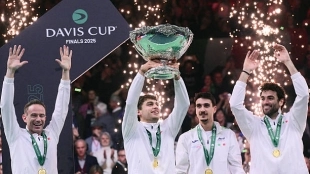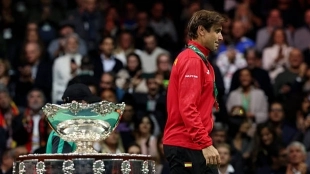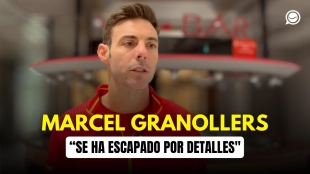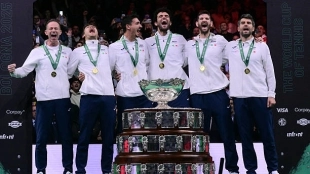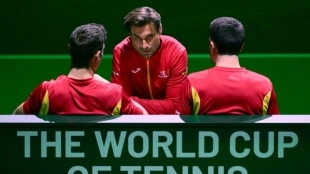
One year has officially passed since Rafa Nadal hung up his racket. He sits down with Jorge Valdano on the Movistar+ program Universo Valdano to reflect from a different perspective on everything experienced on the courts. The former Spanish tennis player confesses that he reached the end with nothing left in the tank.
It has been 12 months without Rafa Nadal on the circuit, a period that has made the transition between generations more real and the farewell to a Big 3 that Novak Djokovic is struggling to resist. Some time has passed since his retirement at the Davis Cup in Malaga, and Nadal himself now speaks in first person about his experiences.

Rafa Nadal and his current relationship with tennis
"I played 45 minutes with Eala, they asked me to play and I was happy to do so. If I don't have to run, that's fine. Through the academy, I remain involved and watch what I feel like watching. I don't follow day-to-day as before. Now, I watch the matches or moments that I feel like watching."
The adrenaline of tennis, irreplaceable
"I gained peace of mind, in the sense that, in a way, you don't feel that daily responsibility to perform. Sometimes having to perform under unfavorable conditions. That, on a human, personal level, wears you down, and you end up not as happy as someone like me should be. The downside is that a stage that has been exceptionally beautiful for me, exciting, has come to an end. Something I have truly loved has passed, which is competing at the highest level. That adrenaline, those things remain forever.
I think you replace it with many other things in life that can be better in many ways, but what you find in sports is hard to find elsewhere."
Rafa Nadal's retirement
"I went through the respect you must have for change. All changes in life, at the very least, must generate some respect for how you will react to a new reality, a life that will be different from what you are used to, not only 20 years of a professional career, but since you were 10 years old. Sports and tennis are what I devoted myself to completely.
I was prepared because I exhausted my options to the end. The fact that I had exhausted all the real options I had to continue competing at the level I would have liked to continue at gave me the conviction and peace of mind to end in peace and convinced that it was the decision I had to make because there was no more. The tank was already empty."
The phase before goodbye
"I don't hold any bad memories of this stage. There are people who, logically, thought I should have stopped earlier, that the end didn't make sense. For me, it did make sense: you have to act according to who you are. I acted as such. I tried to exhaust my options until there really weren't any left. I liked what I was doing.
I didn't retire because I was tired of what I was doing or lacked the necessary motivation. I retired because my body couldn't take it anymore. I was still happy doing what I was doing. In the surgery, they told me I had options to fully recover from it. I had to give myself a prudent time to find out. There came a point where I realized I could compete, but not at the level I needed to continue. I pushed my career to the limit, as far as I could take it."
Work or talent?
"You can have all the talent in the world, but you need a capacity for work, discipline, and concentration in tennis. In my sport, talent is what gives you that extra, but a very important part has to be the work. With passion and proper determination, everything is a bit less complicated. Otherwise, it is very difficult to overcome all the difficulties that life throws at you.
Sacrifices are when you do things you don't want to do. In that sense, I haven't made great sacrifices. I have made great efforts, but few sacrifices. I have enjoyed what I have done. I have not felt that I have missed out on practically anything in this life. I have had a more or less balanced life, not at all obsessed with it. I feel that I have done everything a teenager needs to do to feel that I haven't missed a part of my childhood. I had time for everything."
Nadal's relationship with success
"It is true that my media success came at the end of 2004 when we won the Davis Cup in Seville. You can have worldwide success or more local success. My evolution has always been linked to achieving success at different ages. When professional success arrived, I was ready to embrace it. Everything is new, very intense, but I never lost sight of who I was as a person."
Self-demand
"I owe a lot to my uncle, who made me a focused person. He made me be intense, disciplined, and attentive in every training session. If you train like this from a young age, it's easy to evolve in the right way. I always let myself be helped by all the people I had around me. I had the ability to take on the challenge of wanting to achieve my goals and give me real chances to fight for them. I always had the determination to keep improving and to try to stay at the highest level. I was always the most self-critical one, setting the bar of demand highest.
At times, my career has been focused on being a great fighter, having a great ability to concentrate. For me, it's a compliment for it to be this way. You can have a great physique and work capacity, but if the drive doesn't go where it should, unfortunately... There's a tennis quality you need to compete at the highest level."
Rafa Nadal's mentality
"People think I was losing and still believed, but no. What I wasn't doing was giving up. I knew I was losing and thought I would lose, but that didn't stop me from trying. I tried to find permanent solutions. It comes from an understanding of what sports is. Sports is about trying to give your best even if you know you're going to lose. What bothered me most in my career or what would have always annoyed me and that I tolerated poorly was if after playing a tournament, I came home with the feeling of not having done everything in my power to make things go well.
I tried to find solutions rather than focusing on the result. I thought about what I could do to try to change the dynamic. Most of the time when you're losing, you can try things, and the ones that work are always worth it. Sometimes from those moments of mental effort, you achieve small victories that change it over a year."
Rivalries: Big 3 and Sinner-Alcaraz
"You go through phases. When you're younger, you experience everything more intensely. With age, things soften. The positive aspect of our era is that we've finished our careers and can go out to dinner together without any issues. This is something to be proud of. We competed for the most important things, but we didn't take it to extremes. The rivalry stayed on the court, and the personal relationships have always been of respect, admiration, and even a certain friendship towards our rivals.
I feel happy to have been part of this story. Without taking any merit away from Sinner and Alcaraz, who want to do things right, I believe we (the Big 3) have contributed to the new generations thinking that you can be a fierce competitor without needing to hate your rival. You can have a relationship not of friendship, but optimal. It's a good legacy we leave behind."
His story with Roland Garros
"What I experienced there is hard to compare. That story was built from 2005 until this year with the farewell. Without thinking beyond, it has become a story with the most significant record I have. When I think about it, I could have been better than others on that surface, but many things have to come together for that to happen, and they did."
His quirks on the court
"I'm not a very superstitious person, hardly at all. Contrary to what one might think, outside of tennis, I don't have any routines or rituals. All of that stayed on the court and during competition. I needed that. I wish I could reach that level of concentration without the routines. I didn't have them so defined at the beginning of my career. Tennis demands a lot and consumes you inwardly. You go out to the court every day knowing that by night you could be heading back home.
You need to find routines that make you feel comfortable, secure, and help you not lose focus on what you're doing, to isolate yourself from everything else. I tried to reduce them because when I saw myself on television, I didn't like what I saw, but they didn't hinder me. They gave me the feeling of being 100% focused on what I was doing. It kept me centered on the moment."
Copying is the easiest thing. You have to look at the people who do things better than you, try the things you like about them. In tennis terms, it's the same. Of course, I looked at things my rivals did to try to improve. When I trained, in my daily life, I didn't think about them."
The Big 3 and the evolution of tennis
"We came from Pete Sampras, who had 14 Grand Slams. It's human that some of our generation, when they reached 14, might have thought it was the maximum. Being three of us, not two, never left room for relaxation. The demand was maximum. We never stopped demanding from each other. You had no margin for throwing tournaments. That's the greatness of our era. We were always in the final rounds competing for the most important tournaments. I don't think one alone would have been able to do it.
I don't think it changed that much. The world evolves, and the way of playing is a bit different. The shots are stronger, the serving is stronger. I still believe in intuition, not playing like a robot trying to guess according to statistics. It's something I talked about with Federer, and he didn't like having an excess of information."
This news is an automatic translation. You can read the original news, Nadal: "Llevé mi carrera al límite, intenté apurar mis opciones hasta que no las había"






